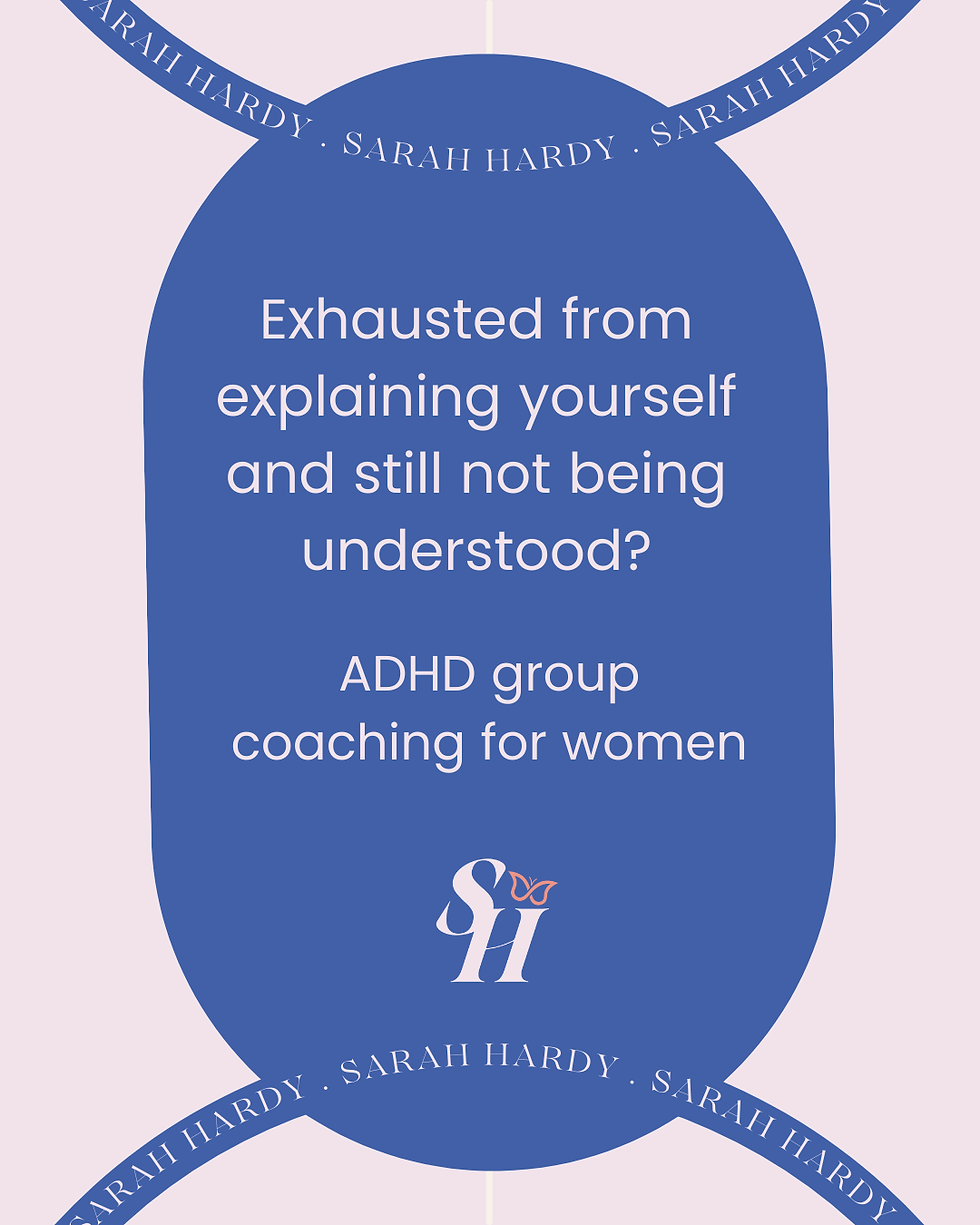When You Know What to Do, But You Just Can’t Do It – ADHD & Executive Function Challenges
- Sarah Hardy
- May 8, 2025
- 7 min read
Updated: Jun 10, 2025
Understanding Executive Function Challenges Without Shame
You’ve made the to-do list. You’ve talked about the task. You know what needs to be done… and yet, nothing happens.
Welcome to the painful, invisible gap between intention and action—something that many neurodivergent people live with daily.
It’s not laziness. It’s not because you don’t care. It’s a sign of executive function challenges—something rarely talked about in ways that feel human, compassionate, or relatable.
What Are Executive Function Challenges?
Executive functions are the behind-the-scenes brain processes that help you:
Start a task
Switch between things
Manage time
Organise information
Regulate emotions
Follow through to completion
If you’re Autistic or ADHD, these functions can be inconsistent, unreliable, or totally inaccessible—especially during stress, sensory overload, or burnout.
So what might look like “forgetting” or “being flaky” on the outside…is actually a real neurological difference that makes doing the thing incredibly hard, even if you really want to.
📖 Explore the full blog series on Mental Health and Neurodivergence. From executive functioning to emotional overload, discover how ADHD, Autism, and Dyslexia shape our mental health—and what actually helps. Find the full series here.
“Why Can’t I Just Do It?”
If you’ve ever asked yourself that, you’re not alone.
You might:
Rehearse a task in your head 20 times but never start it
Feel so overwhelmed by a 5-minute form that you ignore it for weeks
Get stuck in a loop of “I’ll do it later” even when there’s time right now
Procrastinate so long you start believing it’s a character flaw
This isn't about poor time management or needing more motivation. It’s your brain’s way of protecting you from perceived overwhelm, failure, rejection, or cognitive fatigue.
Why This Feels So Personal
For many late/self-discovered ADHDers and Autistic adults—especially women and parents—the impact of executive function challenges is tangled with guilt, shame, and self-blame.
Because you:
“Should” know better
“Have responsibilities”
“Did it yesterday, so why not today?”
“Look fine from the outside”
The inconsistency is brutal. One day you're hyper-focused and flying through tasks. The next, you're paralysed by an empty dishwasher or an unread email.
And trying to explain this to others—when you don’t fully understand it yourself—is exhausting.
Something that makes this even harder: it’s not just that you might struggle to explain it. It’s that even when you try, people might not understand.
This is sometimes called the double empathy problem—a concept that says communication breakdowns between neurodivergent and non-neurodivergent people go both ways. It’s not about you being “bad at explaining.”
It’s that most systems, and even some people, aren’t set up to really hear what you’re trying to say. That misunderstanding can leave you feeling even more isolated or ashamed. But please know: it’s not your fault.
When Everyday Tasks Feel Huge
Let’s break it down. Here are a few common examples of executive function challenges in everyday life:
Task | What People See | What’s Actually Happening |
Responding to a message | “She’s ignoring me” | “I read it, got overwhelmed, forgot to reply, now I feel bad” |
Starting work | “He’s lazy” | “There’s too much to do and I don’t know where to begin” |
Doing paperwork | “She’s disorganised” | “Every time I try, my brain freezes and I shut down” |
Changing plans | “He’s being difficult” | “I’m trying to process the change and it feels like too much” |
None of this means you’re incompetent. It just means you process things differently—and that difference needs to be understood, not judged.
ADHD, Autism, and Mental Load
If you’re managing work, parenting, relationships, and life while also living with executive function challenges—it’s no wonder you feel overloaded.
And if you’re the “one who holds everything together,” it’s likely your mental load is even heavier.
Neurodivergent women, especially, are often praised for being “organised” or “capable” because they’ve overcompensated for years.
But that can collapse in burnout, especially if you:
Are masking constantly
Lack consistent support
Are expected to keep up with neurotypical systems and structures
This is why your brain feels like it just… stops.
So What Helps?
Here’s what I’ve found to be genuinely useful—for me, and many of my coaching clients:
🔹 Break it down smaller than you think necessary
Sometimes the first step isn’t “do the task.” It’s:
Open the laptop
Get the form on screen
Breathe
Name what’s hard
And if you’re Autistic, there may be an added layer to this called monotropism, a theory that describes how we focus deeply on one thing at a time.
When we’re interrupted, or expected to switch gears quickly, it doesn’t just feel difficult—it can feel distressing or physically uncomfortable. That’s why the act of thinking about a task and the act of doing it often feel like two completely different states of being.
If that rings true for you, you’re not alone and you’re not imagining it.
🔹 Externalise the task
Your brain may know what to do, but can’t hold it all in working memory. Use:
Visual checklists
Voice notes
Alarms and timers
Talking it out with someone else
🔹 Don’t wait for motivation—build structure
You don’t need to “feel ready.” You need an environment that supports follow-through:
Body doubling
Lo-fi playlists
Clear start/end times
Permission to try badly
🔹 Have compassion for the freeze
If you can’t do it, try to understand before you push.
Ask yourself:
Am I overwhelmed, under-stimulated, or exhausted?
Do I need connection before action?
Can I try a different way—or leave it for now?
It’s Not About Fixing You—It’s About Understanding You
You’re not a failed adult. You’re not broken. You’re living in a world not designed for how your brain works.
Support isn’t about changing who you are—it’s about finding strategies that help you do the things that matter to you, in a way that’s sustainable.
That’s where coaching can come in.
Want Support That Gets It?
If you’re stuck in that gap between knowing and doing, you’re not alone.
I offer coaching support specifically for neurodivergent adults navigating overwhelm, mental load, and emotional burnout. And I keep one part-funded place open for those who might struggle to access support otherwise.
🛑 A Gentle Note on Mental Health & Coaching Support
While coaching can be a powerful and therapeutic space, it isn’t a substitute for mental health crisis support or clinical care.
If you’re currently experiencing an active mental health crisis—feeling unsafe, overwhelmed, or like things are too much to manage—please know that you don’t have to go through it alone. Coaching may not be the right support in those moments, and it’s important to speak to someone trained to help.
I know (first-hand) that reaching out to a GP can sometimes feel like a mountain to climb—especially if you're already navigating Rejection Sensitivity, communication barriers, or long waits just to get through reception. But help is still available.
There are free, confidential services that don’t require appointments, long explanations, or phone calls—because I understand how hard even that can feel.
📱 Text Support (UK-based):Shout offers free, 24/7 mental health support via text.Just text SHOUT to 85258 to speak with a trained volunteer.Confidential. No pressure. No speaking required.
📞 Call Support:Samaritans are available 24/7, free of charge. Call 116 123 to talk to someone completely confidentially.They’ll listen without judgement—whatever you’re going through.
If you’re in immediate danger or need urgent help, please call 999 or visit A&E.
You are not a burden. You matter. And you deserve the right kind of support—whatever that looks like for you today.
FAQ: Executive Function & Neurodivergence
What are executive function challenges? They’re difficulties with planning, starting, finishing, or switching tasks. They’re common in ADHD and Autism and can make everyday activities feel overwhelming or impossible.
Why do I procrastinate even on important things? Procrastination isn’t laziness—it’s often a sign of overwhelm, fear of failure, or mental fatigue. Your brain might be protecting itself from perceived threat.
Why is this harder some days than others? Executive function is influenced by stress, hormones, sleep, environment, sensory input, and social dynamics. It’s normal for it to fluctuate.
Can coaching help with this? Yes—especially when it’s neurodiversity-affirming. Coaching can help you identify what’s getting in the way, build routines that work with your brain, and reduce shame around inconsistency.
📚 Further Reading
The Double Empathy Problem – Dr. Damian Milton
Understanding ADHD & Executive Function – ADDitude Magazine
A Note on Perspective, Experience and Understanding
While I always aim to share well-informed, respectful, and research-backed content, everything I write comes from my own experience, lens, and learning.
I don’t claim to speak for the whole neurodivergent community, and I don’t believe there’s only one valid way to experience ADHD, Autism, or mental health.
Please take from this what resonates, and feel free to leave what doesn’t.
Your journey might look entirely different to mine—and that’s okay.
I’m always learning, and the language I use throughout my blogs may evolve as I discover more. I’m open to discussing the content of my work and making updates when needed.
About Me: I’m Sarah, a white, British woman in my late thirties.
I was late diagnosed with ADHD at 35, and I’m currently exploring a likely self-discovery of Autism. I’m a mum of two, with a background in psychology, counselling, coaching and business support.
I hold a degree in Psychology, Psychotherapy & Counselling, and I’m currently completing a Master’s in Positive Psychology and Coaching Psychology.
My research focuses on how coaching supports neurodivergent people, and how that experience may differ from neurotypical coaching frameworks.
I coach all people but have a special interest in working with neurodivergent adults—especially those who were diagnosed or self-discovered later in life—and my goal is always to offer support that’s practical, affirming, and shame-free.





Comments